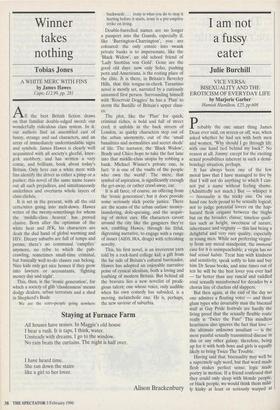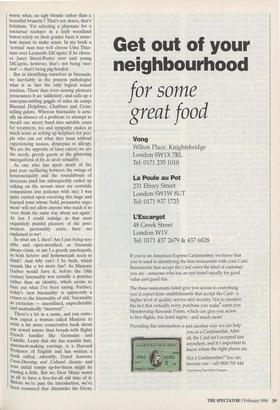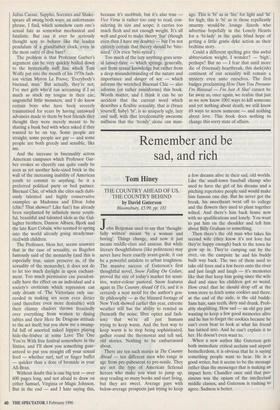I am not
a fussy eater
Julie Burchill
VICE VERSA: BISEXUALITY AND THE EROTICISM OF EVERYDAY LIFE by Marjorie Garber Hamish Hamilton, £25, pp.608 Probably the one smart thing James Dean ever said, on screen or off, was, when asked whether he had sex with both men and women, 'Why should I go through life with one hand tied behind my back?' No reason at all, Jimmy; except for the exciting sexual possibilities inherent in such a demi- bondage situation, perhaps.
It has always been one of the few moral laws that I have managed to live by that I will not do anything to which I can- not put a name without feeling shame. (Admittedly not much.) But — whisper it — bisexuality is the tricky one. On one hand one feels proud to be sexually logical; not to judge potential lovers on the hap- hazard flesh origami between the thighs but on the broader, classic, timeless quali- ties such as height, sweetness of nature, inheritance and virginity — this last being a delightful and very rare quality, especially in young men. While not preferring virgini- ty from any moral standpoint, the immoral case for it is unimpeachable; a virgin has no bad sexual habits. Treat him with kindness and sensitivity, speak softly to him and buy him Dr Seuss books, and nine times out of ten he will be the best lover you ever had — far better than any rancid and raddled roué sexually misinformed for decades by a chorus line of clueless old slappers.
But then again, at the end of the day no one admires a floating voter — and those glum types who invariably man the bisexual stall at Gay Pride festivals are hardly the living proof that the sexually flexible route really is 'Twice the Fun!' This mindless heartiness also ignores the fact that love the ultimate unknown assailant — is the most painful sexually transmitted disease in this or any other galaxy; therefore, being up for it with both boys and girls is equally likely to bring Twice The Trouble.
Having said that, bisexuality may well be a supremely ugly word, but that word made flesh makes perfect sense; logic made poetry in motion. If a friend confessed that they could only sleep with blonde people, or black people, we would think them mild- ly kinky at least or seriously warped at worst; what, an ugly blonde rather than a beautiful brunette? That's not desire, that's fetishism. Yet selecting a playmate for a nocturnal scamper in a leafy woodland bower solely on their gender basis is some- how meant to make sense. In my book a `normal' man may well choose Uma Thur- man over Leonardo DiCaprio; if he choos- es Janet Street-Porter over said young DiCaprio, however, that's not being 'nor- mal' — that's being pig-headed.
But in identifying ourselves as bisexuals, we inevitably in the process pathologise what is in fact the only logical sexual position. These days even naming pleasure pronounces it an 'addiction', and calls up a saucepan-rattling gaggle of aides de camp; Bisexual Helplines, Chatlines and Coun- selling galore. Whereas bisexuality is actu- ally an absence of a problem; to attempt to mould our merry band into suitable cases for treatment, tea and sympathy makes as much sense as setting up helplines for peo- ple who can eat what they want without experiencing nausea, dyspepsia or allergy. We are the opposite of fussy eaters; we are the needy, greedy guests at the glistening smorgasbord of fin de siecle sexuality.
As one who has spent much of the past year vacillating between the swings of heterosexuality and the roundabouts of inversion (and has subsequently ended up sulking on the seesaw since my erstwhile companions lost patience with me) I was quite excited upon receiving this huge and learned tome whose `bold, persuasive argu- ment' will not allow anyone who reads it to `ever think the same way about sex again'. At last I could indulge in that most exquisitely painful pleasure of the post- modern personality crisis; have me explained to me!
So what am I, then? Am I just being sen- sible and open-mouthed, as bisexuals always claim, or am I a greedy psychopath, as both hetero- and homosexuals seem to think? And why can't I be both, which sounds like a lot more fun? As Marjorie Garber would have it, before the 18th century bisexuality was actually a practice rather than an identity, which seems to bear out what I've been saying. Further, today's `new bisexuality' is apparently a return to the bisexuality of old; `bisexuality as eroticism — unconfined, unpredictable and unabashedly "incorrect".'
There's a lot in a name, and you some- how expect a woman called Marjorie to write a far more conservative book about our sexual nature than broads with flighty French handles like Germaine and Camille. Learn that she has sensible hair, statement-making earrings, is a Harvard Professor of English and has written a book called, adorably, Vested Interests: Cross-Dressing and Cultural Anxiety and your initial rompy up-for-itness might be Waning a little. But no; Dear Marje wants us all to have a free-for-all old time of it. Before we're past the introduction, we've been reassured that Alexander the Great, Julius Caesar, Sappho, Socrates and Shake- speare all swung both ways; an unfortunate phrase, I find, which somehow casts one's sexual fate as somewhat mechanical and fatalistic. But can it ever be seriously thought sexy to behave like the leaden pendulum of a grandfather clock, even in the most outré of dive bars?
The problem is that Professor Garber's argument can be very quickly boiled down to the hysterically naff line which Tom Wolfe put into the mouth of his 1970s fash- ion victim Myron Le Poove; 'Everybody's bisexual, man.' But actually, they're not; I've met girls who'd run screaming if I so much as stuck my tongue in their ear, ungrateful little monsters, and I do know certain boys who have been severely traumatised for years by having untoward advances made to them by best friends they thought they were merely meant to be sharing a bunk bed with when asked if they wanted to be on top. Some people are straight, some people are gay — and some people are both greedy and sensible, like me.
And the increase in bisexuality across American campuses which Professor Gar- ber evokes so cheerily can quite easily be seen as yet another hole-sized brick in the wall of the increasing inability of American youth to commit to anything, be it a preferred political party or bed partner. Bisexual Chic, of which she cites such dubi- ously talented and highly conservative examples as Madonna and Elton John (chic? That shower? Like fun!) has already been surplanted by infinitely more youth- ful, beautiful and talented idols as the Gal- lagher brothers, Damon Albarn, Bjork and the late Kurt Cobain, who seemed to spring into the world already going steady/mar- ried/with children.
The Professor, bless her, seems unaware that in the case of sexuality, as Bagehot famously said of the monarchy (and this is especially true, saints preserve us, of the sexuality of the monarchy), it does not do to let too much daylight in upon enchant- ment. Too much permission can paradoxi- cally have the effect on an individual and a society's eroticism which repression can only dream of. The Victorians only suc- ceeded in making sex seem even dirtier (and therefore even more desirable) with their chintzy chadors thrown frenziedly over everything from women to dining tables and their Here Be Dragons attitude to the act itself; but you show me a swamp- ful full of assorted naked hippies playing hide-the-frisbee at some Love The One You're With free festival somewhere in the Sixties, and I'll show you something guar- anteed to put you straight off your sexual feed — whether surf, turf or finger buffet — quicker than a dose of bromide in your All-Bran.
Without doubt this is one big text — over 600 pages long, and not afraid to draw on either Samuel, Virginia or Magic Johnson. But in the end — and I hate saying this, because it's snobbish, but it's also true Vice Versa is rather too easy to read, con- sidering its size and scope; it carries too much flesh and not enough weight. It's all well and good to make theory `fun' (though even then I have my doubts) — but I'm not entirely certain that theory should be 'bite- sized.' (Or even `byte-syzed').
Too much of the lazy anything-goes sexu- al laissez-faire — which springs, generally, not from sexual knowledge but rather from a deep misunderstanding of the nature and importance and danger of sex — which informs the wretched Bisexual Chic — also informs (or rather misinforms) this book. Words matter, and I think it can be no accident that the current word which describes a flexible sexuality, that is (brace yourself, baby) 'bi', is so uniquely ugly, lazy and naff, with that irredeemably awesome naffness that the 'trendy' alone can man- age. This is `bi' as in 'lite' for light and 'hi' for high; this is `13i' as in those repellently smarmy would-be lounge lizards who advertise hopefully in the Lonely Hearts for a ti-lady' in the quite blind hope of getting a little gratis dyke action as their bedtime story.
Could a different spelling give this awful abbreviation weight, I wonder? — perhaps? But no — I fear that until more die of (bisexual) heartbreak, this dark(ish) continent of our sexuality will remain a mystery even unto ourselves. The first badges proclaiming How Dare You Presume I'm Bisexual — I'm Just A Slut! cannot be far away as, once again, we realise that just as we now know 1001 ways to kill someone and yet nothing about death, we still know 69 ways to screw someone — and nothing about love. This book does nothing to change this sorry state of affairs.




































































 Previous page
Previous page